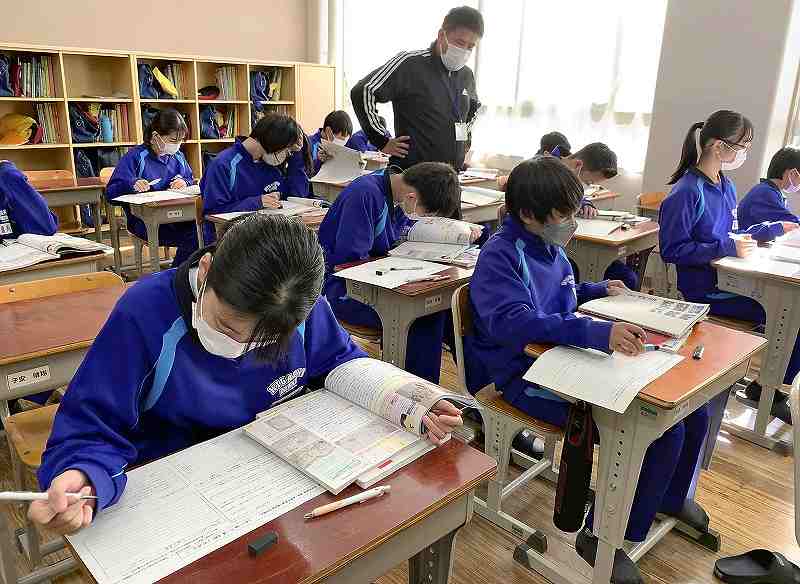
Students take an essay-style social studies unit quiz while consulting their textbooks and notebooks at Higashi Junior High School in Ogaki, Gifu Prefecture, on Nov. 4.
17:27 JST, November 12, 2022
Many junior high schools are taking a new tack toward tests.
An increasing number of schools are reconsidering regularly scheduled exams such as the midterm and final, and instead giving quizzes more often and having students make presentations and discuss topics among themselves in a bid to eliminate last-minute cramming.
Such school are taking various measures to help students develop a positive attitude toward self-study.
Open notebooks OK
Second-year students took a social studies unit quiz on Nov. 4 at Higashi Junior High School in Ogaki, Gifu Prefecture.
“Write your thoughts on what political reform contributed most to the longevity of the Tokugawa shogunate,” a teacher said to the students.
The exercise gets them to evaluate political reforms in the Edo period (1603-1867) from the viewpoint of a bureaucrat in the Meiji era (1868-1912). During the 25-minute quiz, students were free to consult their textbooks and notebooks.
This year, the school abolished regularly scheduled exams that had been conducted three times a year. Instead, the school has quizzes for each unit once every two or three weeks. A student’s performance is evaluated based on the results of the quizzes as well as their presentations and reports. However, to assess their knowledge, the school still conducts question-and-answer format tests in which students cannot view reference materials.
The school’s principal initiated the exam reform.
“Since the scope of regularly scheduled exams is so broad, students tend to cram for the test and try to guess what the questions will be,” the school principal said. “I wondered if last-minute cramming truly helps students acquire genuine academic abilities.”
Prior to implementing the reform, the ideas were criticized for likely leading to a decline in academic performance and making evaluation difficult. However, believing that the reform would make it easier for students to review what they have learned in classes and help them establish good study habits and stay motivated, the principal decided to implement the reform.
A student who took the quiz on the day said, “I used to just memorize years and terms in history, but I changed the way I study. I’ve been trying to understand the flow of history and explain it. Now, I feel that I can answer essay questions more capably.”
Encouraging self-study
The process of reviewing regularly scheduled tests was reportedly influenced by an exercise undertaken by Kojimachi Junior High School in Chiyoda Ward, Tokyo, in the 2018 school year. The school shifted from conducting regularly scheduled exams to unit quizzes and allowed students to retake quizzes, aiming to encourage pupils to learn on their own.
“Five years have passed since the current system was introduced,” said Kazuyoshi Osada, the school’s principal. “Now, students are more willing to study and more aware of the need to study in a planned manner.”
Sakuragaoka Junior High School in Akaiwa, Okayama Prefecture, incrementally abolished regularly scheduled exams from 2020 and introduced unit quizzes that students are allowed to retake as well as “summary tests” to assess students’ abilities to think and express their ideas.
“Students felt that they were forced to take regularly scheduled exams, while the introduction of the quizzes has helped create an atmosphere among students to study on their own,” said the school principal Atsushi Muramatsu.
In a questionnaire of the national achievement test conducted in April, 86.9% of the school’s students gave a positive answer to a question asking if they review what they understand and what they do not understand very well, and utilize that review when they study next. The national average was 74.9%.
Ability to think
Another factor behind the abolishment of regularly scheduled exams is that the new Courses of Study, which have been implemented incrementally for elementary, junior high and high schools since 2020, focus on the ability to think and express oneself, as well as knowledge.
Shibetsu Junior High School in Shibetsu, Hokkaido, not only reduced the number of regularly scheduled exams from four times a year to two, but also began to more highly evaluate group discussions and reports. The school said these changes have led to a more positive attitude toward learning among the students.
Top Articles in Society
-

Producer Behind Pop Group XG Arrested for Cocaine Possession
-

Man Infected with Measles Reportedly Dined at Restaurant in Tokyo Station
-

Man Infected with Measles May Have Come in Contact with Many People in Tokyo, Went to Store, Restaurant Around When Symptoms Emerged
-

Woman with Measles Visited Hospital in Tokyo Multiple Times Before Being Diagnosed with Disease
-

Australian Woman Dies After Mishap on Ski Lift in Nagano Prefecture
JN ACCESS RANKING
-

Producer Behind Pop Group XG Arrested for Cocaine Possession
-

Japan PM Takaichi’s Cabinet Resigns en Masse
-

Man Infected with Measles Reportedly Dined at Restaurant in Tokyo Station
-

Israeli Ambassador to Japan Speaks about Japan’s Role in the Reconstruction of Gaza
-

Videos Plagiarized, Reposted with False Subtitles Claiming ‘Ryukyu Belongs to China’; Anti-China False Information Also Posted in Japan



















